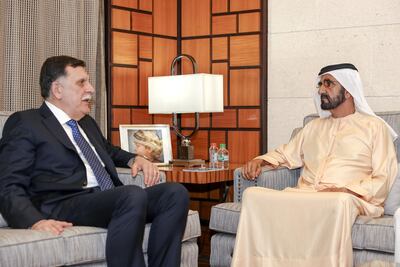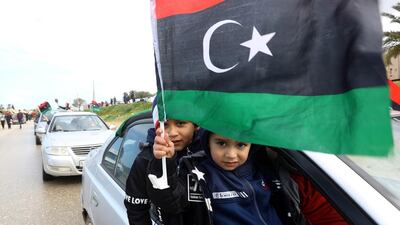Libya is looking to hold parliament and presidential elections by the end of the year, the UN-backed Prime Minister Fayez Al Sarraj said on Tuesday.
The announcement comes days after Mr Al Sarraj met with Libyan National Army head, Gen Khalifa Haftar, in Abu Dhabi and the pair agreed to work towards a vote.
The country is divided into those who recognise the government in Tripoli and those that back Mr Haftar’s parallel administration in the east.
Few details of Mr Al Sarraj’s meeting with Gen Haftar but the prime minister said they had met "in order to stop bloodshed, reach a formula of avoiding our country's conflict and military escalation."

Egyptian Foreign Minister Sameh Shoukry, Algeria's Abdelkader Messahel and Tunisia's Khemais Jhinaoui also met in Cairo on Tuesday to discuss the situation in the country.
The EU, UN and many Libyan politicians pushed a plan to hold elections in late 2018, but international agencies had given up on the idea by November due to cycles of clashes in Tripoli.
Libya has been plagued by insecurity and clashes between rival militias vying for control and influence since 2011 when an uprising led to international military support to the armed overthrow of long-time leader Muammar Qaddafi.
But in the violence, hardline elements have taken root with ISIS fighters seizing territory. Although the militants have been largely beaten back after a US-supported campaign in 2016, Interior Minister in the Tripoli administration, Fathi Bashagha, said that ISIS could seize upon divisions in the country to stage a comeback.
"The danger is grave because we’re not capable of fighting them in an ideal way so long as the divisions remain," Mr Bashagha said in an interview from Tunis on Tuesday.
He called on the US to step up assistance to Libya saying that while the international coalition against ISIS was focused on the battle against the last bastion of the group east of the Euphrates in the eastern Syrian town of Baghouz, the battle elsewhere should not be overlooked.
In January, Gen Haftar launched a southern offensive against what he called "gangs, Islamic State terrorists and criminals".
The operation has seen Gen Haftar’s forces wrest control of the Sharara oil field, capable of producing 315,000 barrels a day, from militants.
But the capture led to a standoff with the National Oil Company who refused to restart production until all armed groups had left the area.
NOC said on Monday that Sharara’s operating company Akakus had received written assurance from Haftar’s Libyan National Army that all individuals subject to Public Prosecutor arrest warrants have been removed from the field and will not be re-admitted to the site.
“Plans are also in place to repair the 20,000 barrels per day lost production capacity destroyed by looting and vandalism during the blockade,” NOC said in a statement.
The news comes after the UAE reportedly hosted a meeting between NOC Chairman Mustafa Sanalla and Mr Al Sarraj aimed at persuading the company to reopen the field, Reuters quoted diplomats as saying.
Last July, Gen Haftar seized the oil ports of Lanuf, Es Sider, Zueitina and Hariga claiming that the head of the central bank in Tripoli was using petroleum income to fund extremist and hardline groups. He demanded that Saddek Elkaber stand down. After three weeks Gen Haftar returned the sites to the NOC.

